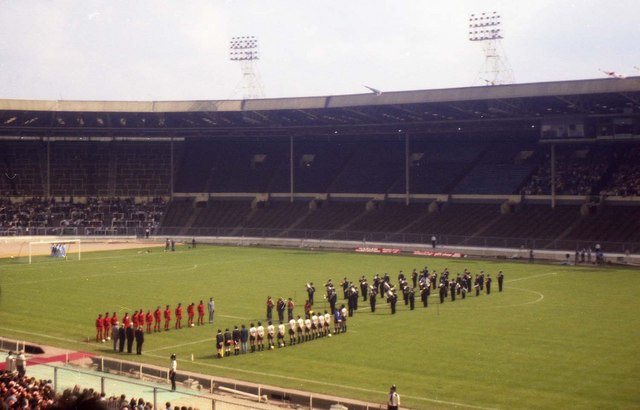When I spoke to my grandfather last week about the death of Nobby Stiles, he simply replied back, “When midfield destroyers were destroyers.”
If you ask most English football fans, especially those of my generation, to name the players who were instrumental in the country’s only World Cup triumph in 1966, you are met with the usual suspects.
Bobby Moore, Sir Bobby Charlton, Sir Geoff Hurst, Gordan Banks. All legendary footballers in their own right, that most people who knew even miniscule amounts about football could guess.
But if you ask more committed football fans, one name appears regularly in those first few names: Nobby Stiles.
The 78-year old sadly died last week, after a long battle with illness. He had both prostate cancer and advanced dementia, diagnosed after a minor stroke in 2010.
Stiles became the seventh member of the England starting XI who defeated West Germany in the 1966 World Cup Final to die, following Moore, Alan Ball, Ray Wilson, Banks, Martin Peters and Jack Charlton, who also passed away this year.
But as his teammates grabbed the headlines, it is easy to forget the unquestionable talent and sizeable contribution of a no-nonsense midfielder who enjoyed both international and domestic success.
The player: Success at home and abroad
Born in Collyhurst, Manchester, Stiles spent the vast majority of his playing career at Manchester United. From 1960 – 71 he made almost 400 appearances and scored 19 goals, making his debut aged just 18. Two-year spells at Middlesbrough and Preston North End followed, making around 50 appearances at both clubs, before retirement in 1975.
Described by his former club as, “the pulsing heartbeat of Sir Matt Busby’s side for over a decade” Stiles was instrumental as United lifted the First Division title in 1965 and 1967. But perhaps he is better known for his role in the iconic United side that became the first English team to lift the European Cup (now the Champions League) by beating Benfica in 1968. Those successes assured his place in club history.
On the international stage, following his debut in 1965, Stiles again became a lynchpin of Sir Alf Ramsey’s England side. He played in all of his country’s games in the 1966 World Cup, despite calls for him to be dropped after picking up a retrospective caution from the game against France. Even the FA told Ramsey to drop Stiles, to which Ramsey responded by threatening to resign in the middle of a World Cup on home soil.
Stiles repaid the faith shown in him, totally neutralising Portuguese superstar Eusebio – one of the best players in the world at that point – in the semi-final. If his pugnacious manner on the pitch did not win him fans before the World Cup final, it was swiftly forgotten afterwards, as images of Stiles dancing around the Wembley pitch became etched in the minds of generations to come. He remains one of only three Englishmen to have won the World Cup and the European Cup.
The man: A tiger with heart
Off the pitch, Stiles was not a man who immediately strike you as a World Cup winner.
Measuring just 5ft 6in, with cumbersome spectacles due to heavy short-sightedness, Stiles was described by many as warm and kind, with Mark Lawrenson describing him as, “an absolute gentleman.” He was a popular after-dinner speaker before he withdrew from public life due to illness.
On the pitch, Stiles took no prisoners. With his dentures removed to reveal a large gap in his front teeth, he quickly earned the nickname, “The Toothless Tiger.”
That attitude was not just shown to opponents, with teammates recounting tales of Stiles’ demanding nature. His drive to win meant mistakes had to be minimised.
His game plan was simple, for both United and England. In an interview with the Guardian in 2002, he said: “My job was to win it [the ball], give it to Bobby [Charlton] and let him get on with it.”
The Manchester United obituary made reference to a comment made by Busby to his midfield enforcer before games; “Norrie, let him know you’re there in the first five minutes.” Stiles fulfilled his brief most games.
But whilst with a simple brief and not being afraid to put himself about, Stiles had real talent beyond being a tough tackler.
“A great reader of the game – Bobby Charlton always mentions that,” said former United manager Sir Alex Ferguson speaking to the BBC.
“A marvellous reader of the game – influenced the team, could tackle, could pass.”
Whilst Stiles is remembered by millions for his playing days, he is also remembered for nurturing the Class of ’92 after becoming a coach at United in 1989, bringing players such as David Beckham and Ryan Giggs into the limelight.
For football fans in the modern day, and indeed players, they may do well to take a leaf from Stiles’ book. A man who once said he wanted to be, “remembered as a happy person”, who genuinely loved the game and his club, Stiles is the epitome of humble.
A week on from his death, his success is easy to forget when comparing his post-1966 fame to that of his teammates, such as the Charltons and Hurst. But that is no criticism.
Stiles remained down to earth in a way that modern players seemingly do not. Throughout a career of incredible achievement for club and country, Stiles did not wish for fame, but to win and to do his job properly.
He was made an MBE in 2000, and had Collyhurst street named after him in May 2016, such was his popularity amongst people across the country.
But as another member of the group behind England’s finest footballing hour sadly leaves us, Stiles’ legacy will live on. Despite his small stature, his heart, humility and footballing ability are too big to forget.
By Callum Parke

